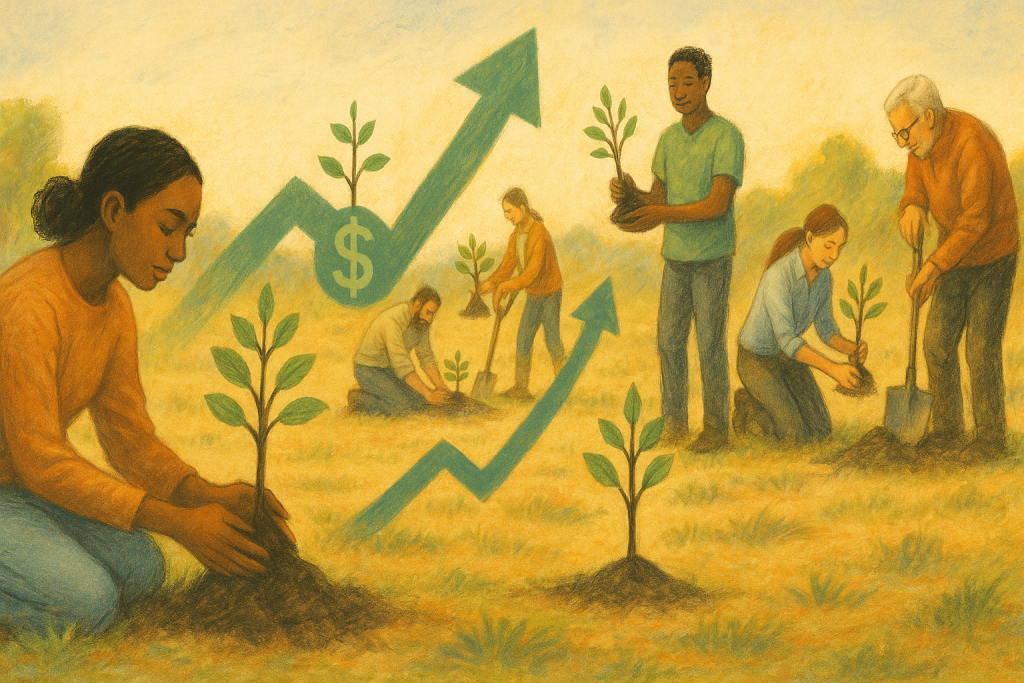In recent years, social impact funds have gained significant traction in the United States, reshaping the landscape of both philanthropy and investment. Unlike traditional investment mechanisms, these funds blend financial objectives with social progress, aiming to generate positive societal outcomes alongside economic returns.
This trend reflects a growing acknowledgment that financial prosperity and societal well-being are interconnected. As more investors, entrepreneurs, and innovators rally behind this dual-purpose approach, the conversation around ethical investment practices continues to evolve, promising transformative changes across sectors and communities.
The emergence of socially responsible investing

Socially responsible investing has been around for decades, but only recently has it started to gain mainstream acceptance. With increasing awareness of environmental, social, and governance (ESG) factors, investors are keener than ever to align their portfolios with their values.
This movement aligns closely with the objectives of social impact funds, which strive to generate tangible positive outcomes. By addressing pressing issues such as climate change, poverty alleviation, and equal opportunity access, these funds offer a compelling argument that investments can achieve more than just financial gain—they can change lives.
Challenges and opportunities in the current market
Social impact funds face several barriers, including skepticism regarding their financial performance compared to traditional funds. However, as awareness and expertise grow, these hurdles are gradually being overcome. New analytical tools and metrics for assessing social impact alongside financial returns help demystify the process and build confidence among investors.
One notable opportunity lies in the millennial generation’s growing influence in the investment space. As the first digital-native generation passionate about sustainability and ethical business practices, millennials are poised to drive demand for socially responsible investing to unprecedented levels.
Navigating the future of impact-driven investments
The rise of social impact funds marks only the beginning of a larger transition within the investment community. As financial markets and regulatory environments evolve, these funds will need to adapt to maintain momentum. This evolution includes integrating more robust reporting mechanisms and transparency measures, allowing investors to track both financial and social outcomes more effectively.
Additionally, collaboration between policymakers, non-profits, and the private sector can help create a more conducive environment for impact investing, paving the way for innovative solutions to deeply entrenched societal challenges.
Strategies for maximizing both impact and return
Investors and fund managers looking to maximize their effect should consider diversifying across a range of sectors and geographies. By doing so, they can mitigate risks while accessing varied opportunities for impact. Furthermore, employing a long-term perspective is crucial. Sustainable change doesn’t happen overnight, and patience can yield substantial benefits.
Engaging with stakeholders and beneficiaries not only provides valuable feedback but helps ensure that strategies remain aligned with community needs. In this interconnected world, creating partnerships with like-minded organizations and individuals can amplify efforts and lead to greater achievements.
The future of purposeful investing
As we look to the future, the potential for social impact funds to redefine the norms of investing becomes ever more evident. While challenges remain, the shifting tides in both investor expectations and societal needs provide fertile ground for meaningful growth. By embedding purpose within financial models, these funds are setting new standards for what it means to succeed economically.
They illustrate that when capital is directed thoughtfully, it holds the power to address some of society’s most pressing problems. Ultimately, this harmonious blend of profit and purpose is positioning socially responsible investing as the new frontier in finance.
